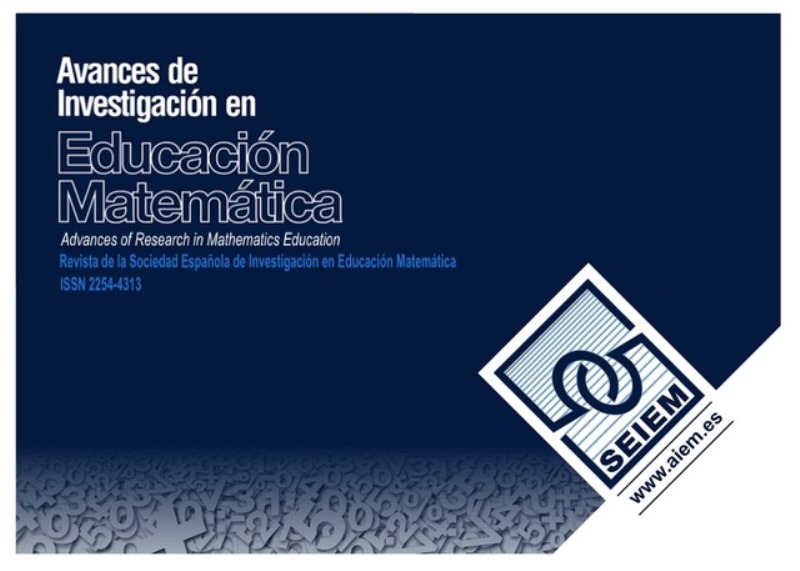Mental constructs associated with eigenvalues and eigenvectors: refining a cognitive model
DOI:
https://doi.org/10.35763/aiem22.4005Keywords:
Eigenvalues and Eigenvectors, APOS theory, Genetic decomposition, Linear transformation, Linear algebraAbstract
Empirical evidence is presented on the mental structures and mechanisms necessary for learning the concept of eigenvalue and eigenvector from the linear transformation, using the research paradigm of the APOE (Action, Process, Object, Scheme) theory. The data of the study are the result of the implementation of teaching based on a cognitive model (Genetic Decomposition) located in a regular linear algebra course of a public university in Colombia. The empirical evidence allows to show a refined cognitive model in relation to the key structures and mechanisms, to account for the Processes underlying the eigenvalue and eigenvector Process and to generate discussion in relation to the whole Process. The recommendations for teaching specify the importance of providing various situations involving the linear transformation and its coordination with the Processes: zero vector - not an eigenvector; solution set of T(v)=)=λ_0v; null space and determinant.
Downloads
References
Andrews-Larson, C., Wawro, M., & Zandieh, M. (2017). A hypothetical learning trajectory for conceptualizing matrices as linear transformations. International Journal of Mathematical Education in Science and Technology, 48(6), 809-829. https://doi.org//10.1080/0020739X.2016.1276225
Arnon, L., Cottrill, J., Dubinsky, E., Oktaç, A., Roa-Fuentes, S., Trigueros, M., & Weller, K. (2014). APOS Theory a framework for research and curriculum education. Springer Netherlands. https://doi.org.//10.1007/978-1-4614-7966-6
Beltrán-Meneu, M., Murillo-Arcila, M., & Albarracin, L. (2017). Emphasizing visualization and physical applications in the study of eigevectors and eigenvalors. Teaching Mathematics and its applications, 36(3), 123-135. http://doi.org//10.1093/teamat/hrw018
Beltrán-Meneu, M., Murillo-Arcila, M., & Jordán, E. (2017). A teaching proposal for the study of eigevectors and eigenvalors. Journal of Technology and Science Education, 7(1), 100-113. http://doi.org.//10.3926/jotse.260
Betancur-Sánchez, A., Roa-Fuentes, S., & Ballesteros, S. (2021). Una descomposición genética preliminar del concepto de eigenvalor y eigenvector: el análisis de libros de texto como sustrato en la construcción de modelos cognitivos. Revista Latinoamericana de Investigación en Matemática Educativa, 24(3), 245-276. https://doi.org/10.12802/relime.21.2431
Dubinsky, E. (1991). Reflective abstraction in advanced mathematical thinking. In D. Tall (Ed.), Advanced mathematical thinking (pp. 95–123). Kluwer.
González, D., & Roa-Fuentes, S. (2017). Un esquema de transformación lineal: construcción de objetos abstractos a partir de la interiorización de acciones concretas. Enseñanza de las ciencias, 35(2), 89-107. https://doi.org/10.5565/rev/ensciencias.2150
Klasa, J. (2010). A few pedagogical designs in linear algebra with Cabri and Maple. Linear algebra and its applications, 432(8), 2100-2111. http://doi.10.1016/j.laa.2009.08.039
Larson, C., & Zandieh, M. (2013). Three interpretations of the matrix equation Ax = b. For the Learning of Mathematics, 33(2), 11–17.
Parraguez, M., & Oktaç, A. (2012). El desarrollo de un Esquema del concepto de espacio vectorial. Paradigma, 33(1), 103-134.
Parraguez, M., Roa-Fuentes, S., Jiménez, R., & Betancur-Sanchez, A. (2022). Estructuras y mecanismos mentales que desde una perspectiva geométrica modelan y articulan el aprendizaje de valor y vector propio en R^2 . Revista Latinoamericana de Investigación en Matemática Educativa, 25(1), 63-92. http://doi.org/10.12802/relime.22.2513
Piaget, J. (1975). Piaget’s theory (G. Cellerier & J. Langer, trans.). In P.B. Neubauer (Ed.), The process of child development (pp. 164–212). Jason Aronson.
Plaxco, D., Zandieh, M., &Wawro, M. (2018) Stretch Directions and Stretch Factors: A Sequence Intended to Support Guided Reinvention of Eigenvector and Eigenvalue. In: S. Stewart, C. Andrews-Larson, A. Berman, & M. Zandieh (Eds.), Challenges and Strategies in Teaching Linear Algebra (pp. 175-192). ICME-13 Monographs. Springer, Cham.
Roa-Fuentes, S. & Oktaç, A. (2010). Construción de una descomposición genética: análisis teórico del concepto transformación lineal. Revista Latinoamericana de Investigación en Matemática Educativa, 13(1), 89-112.
Roa-Fuentes, S. & Parraguez, M. (2017). Estructuras Mentales que Modelan el Aprendizaje de un Teorema del Álgebra Lineal: Un Estudio de Casos en el Contexto Universitario. Formación Universitaria, 10(4), 15-32. http://dx.doi.org/10.4067/S0718-50062017000400003
Salgado, H., & Trigueros, M. (2014). Una experiencia de enseñanza de los valores, vectores y espacios propios basada en la teoría APOE. Educación Matemática, 26(3), 75-107.
Salgado, H., & Trigueros, M. (2015). Teaching eigenvalues and eigenvectors using models and APOS theory. The Journal of Mathematical Behavior, 39, 100-120. https://doi.org/10.1016/j.jmathb.2015.06.005
Schonefeld, S. (1995). Eigenpictures: Picturing the Eigenvector Problem. The College Mathematics Journal, 26(4), 316-319.
Stewart, S., Andrews-Larson, C., Berman, A., & Zandieh, M. (Eds.) (2018). Challenges and Strategies in Teaching Linear Algebra. Springer.
Thomas, M., & Stewart, S. (2011). Eigenvalues and eigenvectors: embodied, symbolic, and formal thinking. Mathematics Education Research Group of Austaralasia, 23(275), 275-296. https://doi.org/10.1007/s13394-011-0016-1
Wawro, M., Zandieh, M., Rasmussen, C., & Andrews-Larson, C. (2013). Inquiry oriented linear algebra: Course materials. http://iola.math.vt.edu
Yáñez, A. (2015). Construcción de los conceptos de valores y vectores propios en R^2y R^3, desde la teoría APOE [Tesis de Maestría no publicada]. Pontificia Universidad Católica de Valparaíso.
Downloads
Published
How to Cite
Issue
Section
License
Copyright (c) 2022 Solange Roa (Autor); Alexander Betancur Sánchez, Marcela Parraguez

This work is licensed under a Creative Commons Attribution 4.0 International License.
The articles published in this journal are under a license Creative Commons: By 4.0 España from number 21 (2022).
Authors who publish with this journal agree to the following terms:
- Authors retain copyright and keep the acknowledgement of authorship.
- The texts published in this journal are – unless indicated otherwise – covered by the Creative Commons Attribution 4.0 international licence. You may copy, distribute, transmit and adapt the work, provided you attribute it (authorship, journal name, publisher) in the manner specified by the author(s) or licensor(s). The full text of the licence can be consulted here: http://creativecommons.org/licenses/by-nc/4.0.
- Authors are able to enter into separate, additional contractual arrangements for the non-exclusive distribution of the journal's published version of the work (e.g., post it to an institutional repository or publish it in a book), with an acknowledgement of its initial publication in this journal.
- Authors are permitted and encouraged to post their work online (e.g., in institutional repositories or on their website) prior to and during the submission process, as it can lead to productive exchanges, as well as earlier and greater citation of published work (See The Effect of Open Access).









